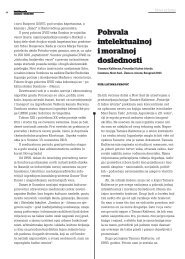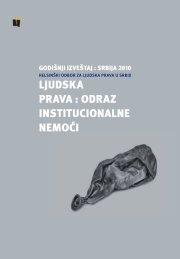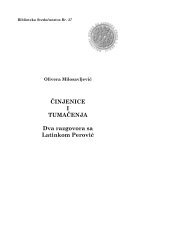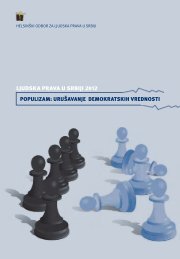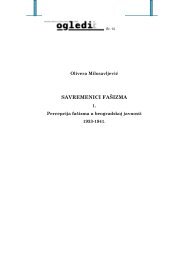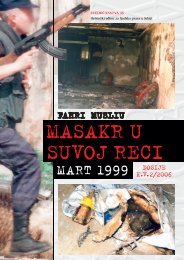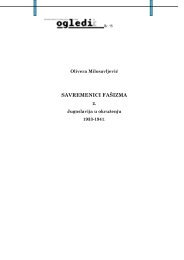Human Rights: Hostage To the State's Regression - Helsinki ...
Human Rights: Hostage To the State's Regression - Helsinki ...
Human Rights: Hostage To the State's Regression - Helsinki ...
You also want an ePaper? Increase the reach of your titles
YUMPU automatically turns print PDFs into web optimized ePapers that Google loves.
<strong>Helsinki</strong> Committee for <strong>Human</strong> <strong>Rights</strong> in Serbia<br />
<strong>the</strong> republican Prime Minister cabinet and <strong>the</strong> cabinet of <strong>the</strong> City Secretary for<br />
Culture, <strong>the</strong> Foreign Ministry competent officials ordered <strong>the</strong> festival<br />
organizers to take <strong>the</strong> film off <strong>the</strong> program. That decision was indeed a<br />
throwback to <strong>the</strong> bleak times of <strong>the</strong> Socialist Republic of Yugoslavia when<br />
creative people were imprisoned for books, films and art works deemed<br />
“controversial” and <strong>the</strong>ir works were hid from <strong>the</strong> public eye. The pertinent<br />
note of <strong>the</strong> Embassy of <strong>the</strong> Popular Republic of China, which inter alia spelled<br />
out that “<strong>the</strong> film should be scrapped from <strong>the</strong> festival program due to good<br />
bilateral relations between Serbia and China” was read to <strong>the</strong> shocked<br />
audience in a movie-house. City Secretary for Culture, Darijan Mihailović, <strong>the</strong>n<br />
went on to explain that republican institutions, competent bodies on <strong>the</strong> level<br />
of <strong>the</strong> city of Belgrade, as well as <strong>the</strong> festival organizers reached that decision<br />
because “<strong>the</strong> highest state interests implied that it would not be wise to make a<br />
diplomatic scandal and offend a friendly country, <strong>the</strong> UN Security Council<br />
permanent member and <strong>the</strong> factor with a major impact on our foreign<br />
relations.”<br />
Then <strong>the</strong> true cause of <strong>the</strong> film-banning, a rare occurrence even in<br />
Serbia, came to <strong>the</strong> fore. Namely that at stake was something more important,<br />
even momentous, and not just plain misunderstanding was subsequently<br />
confirmed by Vladeta Jankovic, an adviser to Prime Minister Kostunica and<br />
Dragan Kojadinovic, Culture Minister. While visibly transported Janković like<br />
a visionary linked <strong>the</strong> authorities unpopular move to <strong>the</strong> future of status of<br />
Kosovo by maintaining that “showing of that film, despite a polite appeal<br />
through diplomatic channels, would impair our efforts to solve <strong>the</strong> Kosovo<br />
problem in <strong>the</strong> desired way” 1 , while Minister Kojadinović for days on end<br />
reiterated that “<strong>the</strong>re are many bilateral, Chinese-Serb co-operation<br />
agreements and provisions which must be honored.” 2 When part of <strong>the</strong><br />
cultural public protested against such a bizarre way of conducting <strong>the</strong> foreign<br />
policy through movie houses programs, in a true twist of destiny, <strong>the</strong> Chinese<br />
film was finally screened in <strong>the</strong> two Belgrade cinemas. However, <strong>the</strong> whole<br />
film-related muddle morphed in fact in <strong>the</strong> most clear metaphor of distortion<br />
of set of values reigning in <strong>the</strong> cultural public scene, and as such resulting from<br />
balance of powers in <strong>the</strong> political sphere. At play is obviously not a mechanical<br />
adoption of criteria from o<strong>the</strong>r spheres, but ra<strong>the</strong>r an ongoing interaction<br />
between <strong>the</strong> political and cultural scene. Namely some artists by <strong>the</strong>ir actions<br />
shape <strong>the</strong> social reality, while some politicians, as evidenced by <strong>the</strong>ir attempts<br />
during <strong>the</strong> requested film banning phenomenon, act as if <strong>the</strong>y were<br />
commissars trying to tailor <strong>the</strong> cultural policy. The foregoing is indicated by<br />
highly damaging stands of some cultural “officials.”<br />
2006.<br />
1 B92, “Banned film would be screened <strong>the</strong> day after tomorrow”, 30 November<br />
2 Idem<br />
<strong>Human</strong> <strong>Rights</strong>: <strong>Hostage</strong> <strong>To</strong> <strong>the</strong> <strong>State's</strong> <strong>Regression</strong><br />
Even without <strong>the</strong> Chinese film scandal, it was obvious that in <strong>the</strong><br />
course of 2006 <strong>the</strong> Culture Ministry was bereft of any strategy or well-designed<br />
cultural policy. Apart from <strong>the</strong> initiative that <strong>the</strong> top 100 artists be granted<br />
national pensions, which by <strong>the</strong> way sowed an additional seed of discord in<br />
<strong>the</strong> midst of that rivalry-charged profession, <strong>the</strong> Ministry did not give off o<strong>the</strong>r<br />
signs of life or existence. This did not come as a surprise in view of <strong>the</strong> fact that<br />
<strong>the</strong> outgoing Minister Dragan Kojadinović found himself in that position quite<br />
accidentally. Namely he became <strong>the</strong> only choice for that position after a<br />
prolonged and entrenched party war over o<strong>the</strong>r, highly valued ministerial<br />
positions during <strong>the</strong> formation of Vojislav Kostunica cabinet. By and large<br />
during all that long jockeying for power someone remembered, in a gesture of<br />
unexpected mercy, that Vuk Draskovic's party should be accorded that leastcoveted<br />
political chair. Aside from emptiness which his work exuded,<br />
Kojadinović shall be remembered for his racism-charged statements about<br />
“Shiptar hordes.... whose fellow-nationals are not fit to take part in renovation<br />
of <strong>the</strong> Serb sacred monastery Hilandar.” 3<br />
Kojadinović, at <strong>the</strong> very start of his mandate, opted for <strong>the</strong> wait- andsee<br />
strategy, namely decided to first “observe <strong>the</strong> state of cultural institutions<br />
and various spheres of cultural life, after which, according to his agenda,<br />
“national cultural councils headed by prominent individuals and public<br />
figures, tasked with creation of cultural strategy, would be set up. And thirdly,<br />
Kojadinovic planned <strong>the</strong> founding of commissions or task forces composed of<br />
philosophers, psychologists, sociologists and o<strong>the</strong>r experts from various social<br />
spheres to be entrusted with <strong>the</strong> primary task “of devising <strong>the</strong> national code of<br />
conduct”. Hence <strong>the</strong> trinity of analysis-strategy-code was laid as <strong>the</strong><br />
foundations of cultural policy, which was only implemented at <strong>the</strong> very end of<br />
Kojadinovic's mandate, due to its factual-unsustainability. True cultural policy<br />
could be reduced to <strong>the</strong> provision of fund for artists able to create worthy<br />
works of art. The rest are just empty stories or words tantamount to a timewasting<br />
exercise.<br />
Due to inertia or passivity of <strong>the</strong> Serb Culture Ministry in 2006, o<strong>the</strong>r<br />
films shared <strong>the</strong> fate of ill-starred “Summer Palace”, despite assurances of <strong>the</strong><br />
political establishment about Serb society essential transformation in <strong>the</strong> post-5<br />
October. In fact <strong>the</strong> reality demonstrated that <strong>the</strong> Serb society was still tottering<br />
under <strong>the</strong> burden of old problems. Thus <strong>the</strong> film „Grbavica” of a young<br />
Bosnian woman director, Jasmila Žbanić, an emotionally charged story about a<br />
3 At night of 3 March a big fire broke out in Hilandar monastery. In <strong>the</strong><br />
aftermath of that fire, Minister of Culture, Dragan Kojadinović, at <strong>the</strong> opening of<br />
Hilandar-<strong>the</strong>med photo exhibition in Zrenjanin, stated that Hilandar should be<br />
renovated exclusively by those of Orthodox faith: “Shiptari hordes can reach any time<br />
Belgrade, and that is exactly <strong>the</strong>ir intention. Perhaps that fire in Hilandar was not an<br />
accident, for this fire from Kosovo may spread to Macedonia, and threatens also Greece<br />
and ...<strong>the</strong> whole Europe.”<br />
54<br />
55



